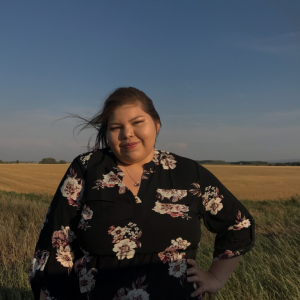Tiana Bone is an Indigenous undergrad student at UBC, she is from Keeseekoowenin Ojibway First Nation (her dad’s Nation). Tiana grew up in a small town called Dauphin, Manitoba — which is roughly an hour between both of her parent’s Nations. She is currently in her third year of studies pursuing a major in English Literature and a minor in First Nations and Indigenous Studies. Tiana is a contributing member to the Indigenous Leadership Collective where she is the chair for ILC participation in Indigenous activism and she also works to ensure this group is both inclusive and inviting.


While being a student invested in your studies, how do you make time to practice your culture on or off UBC campus?
As a full-time student in a predominantly colonial space, practicing my culture is usually done in private (by listening to music, or calling family) or within the Indigenous Leadership Collective. With the Collective, I am given space to practice my culture and be who I am more openly.
What advice do you have for First-Year students? Or, what do you wish you knew as a First-Year Indigenous student?
My advice: Study. Do the readings. Give yourself time, and do not overload your schedule. Don’t be afraid to use your voice, you’ll regret it later.
My own regrets will always be not discovering the Indigenous community on campus sooner. I think I felt so lost in first year because I was so far from my family, but also because I was so far away from my community. However, since connecting with other Indigenous people, UBC feels more like home.
How do you balance school with your personal interests or work life?
I try my best to keep my balance by not over-committing, always making sure I put school-work above other commitments (like work, clubs, etc.). However, sometimes school-work can be the thing causing imbalance, so making time for myself to just recharge is also important to staying in balance. Often hanging out with friends, or just spending time alone keeps me balanced too.
You have become a strong activist in regards to Indigenous advocacy work. What inspired you to become involved? What advice do you have for Indigenous students who might also like to become active with protests and marches within the Vancouver and UBC community?
Oddly enough, I decided from a young age that I would try my best to assist others who need it, Indigenous or not. My first ever form of advocacy was doing a class presentation in grade six on child labour in developing countries. However, coming to UBC and learning about Musqueam and how most of British Columbia is unceded territory, I decided that as an uninvited guest on their territory it is my duty to speak up and join their causes. In FNIS classes, we hear the term “reciprocity” a lot, so fighting alongside the Coast Salish people against issues such as the Kinder Morgan Pipeline is a no brainer.
My advice: Get involved on your own and you will meet like-minded people, or join the ILC, we likely will have a small group going to mobilize collectively for causes!
Where have you been able to find a community on campus?
In my first year, I started by making friends with people who lived in my dorms and in my classes, which I am still friends with. In second-year, I began getting more involved on and off-campus, going to more protests, marches, rallies, etc, while also joining clubs seeing where I fit in. The Longhouse is super nice and welcoming, a great place to study during finals or meet-up with friends. Personally, I spend a lot of time at Irving K. Barber (IKB) as well. I have not exactly found a communal place on campus, but I have found people from various places in order to create a community. So, I feel like my friends and the people I have met from events and such have contributed to a community of people where support and trust is mutual.
You’re a member of the Indigenous Leadership Collective (ILC), can you tell us about your involvement and activities that you have participated in? How has the ILC contributed to your undergrad experience at UBC?
The Indigenous Leadership Collective is really new, and most of the activities I have participated in were the multiple anti-Pipeline marches and rallies, creating a podcast about Indigenous identity for CiTR’s Carving Space, as well as Indigenous Day at Trout Lake. We also coordinated potlucks at people’s homes, where we as a group could just hang-out and rejuvenate. The ILC has given me space to be myself and has really shaped my undergrad experience in the sense of belonging.
The ILC has shown me that I belong at UBC and being here will not only change my life, but help me change others. The people in the ILC are all brilliant and wonderful, they are all going to achieve so much in life and contribute to indigenizing the future. Also, big thank you to Karlene and Maggie for coming up with the idea of the ILC.
Chi-miigwech,
Tiana.


